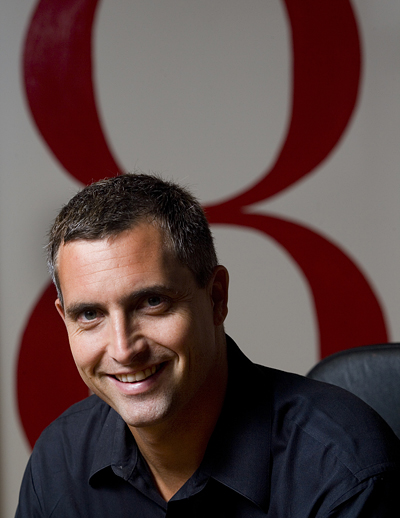Agent Smart
The Olympic medal stand brooks no slackers.
To succeed at the highest echelons of any Olympic sport, an athlete must be talented, driven, competitive, and, above all, incredibly focused. To represent these top athletes, a sports agent must be talented, driven, competitive, and, yes, incredibly focused. Top athletes want a kindred soul who can both present them to the world and protect them from the world’s distractions.

From his office on Portland's waterfront, Peter Carlisle '91 guides business opportunities for an array of Olympic and action-sports athletes. Photograph by Phyllis Graber Jensen.
Enter Peter Carlisle ’91, considered one of sport’s most powerful agents for his pioneering work with Olympic and action-sports athletes. But in addition to athletic zeal — “I’m competitive to a fault,” says Carlisle, who played varsity tennis and club hockey at Bates — he serves up a complementary talent to his athletes: ability to see the big picture.
On the athlete track at Division I University of New Hampshire, Carlisle transferred to Bates after his sophomore year seeking a more eclectic experience. “I like the idea of a balanced life,” he says. “If you want to be able to relate to different people, a small-college experience helps because you are around people with various interests pursuing various activities.
“That’s helpful in my business when dealing with so many different athletes, different marketers, and different brands. Ironically, quite a few pioneers in sports marketing went to Division III schools and played sports. Division III, NESCAC, Bates — it offers a really nice balance.”
After Bates, Carlisle earned a J.D. from the University of Maine School of Law and worked for law firms in Portsmouth and Portland, specializing in business law. Sparked by his own competitive spirit, he gravitated to working with athletes.
“I began to sense opportunities with athletes that required more than mere dabbling, so I decided to go out on my own,” he says.
In 1998, he incorporated Carlisle Sports Management with a rather broad vision, basically “any athlete in northern New England who was marketable at any level.” Early clients included a sailor and, he notes with a laugh, even a woman who excelled at the tractor pull.
But Carlisle was one of the few sports agents who saw the marketing potential of athletes competing in extreme sports like skateboarding and snowboarding. Summer and winter X Games had just debuted, and snowboarding had been further legitimized by joining the Olympic roster of sports at Nagano, Japan, in 1998. “There was a lot of momentum for marketing the sport. So I thought to myself: ‘I’m going after this,’” he says.
And go after it Carlisle did, traveling to a Las Vegas trade show to meet some top snowboarders after the 1998 Winter Olympics. His persistence and charm paid off, as he signed Ross Powers, the Olympic bronze medalist in the halfpipe. With Powers as his lure, Carlisle then convinced several leading companies, like Nokia and Ralph Lauren Polo, that aligning themselves with young athletes such as Powers would help them reach the youth market. Rapid success with Powers led to contracts with several other top snowboarders such as Seth Wescott and Kelly Clark.
Carlisle’s skill in representing youthful extreme sports did not go unnoticed. “We were the pioneer of that space, but other big agencies began to snoop around,” he says. In 2001, Octagon, a global sports and entertainment marketing firm, acquired Carlisle Sports Management.
Today, Carlisle oversees the 15 employees of Octagon’s Olympic and Action Sports Division in a spacious fourth-floor office on Portland’s waterfront. His portfolio of athletes, extending well beyond the snowboarding elite, has included swimmers Ian Crocker, Michael Phelps, and Katie Hoff, speedskater Shani Davis, wrestler Rulon Gardner, and figure skater Oxana Baiul. And in 2004 Carlisle was named to the Sporting News Power 100 list as one of the 100 most powerful people in sports.
Carlisle is now in the heat of preparations for the Beijing 2008 Olympic Games, where it’s a lock that his athletes, led by Crocker and Phelps, will bring home a slew of medals. While no day could be described as “typical,” Carlisle estimates that he divides his time equally among dealing with internal matters; communicating with clients; creating corporate opportunities for clients; and creating new marketing vehicles for clients. In the last category, for example, he commissioned production of the 2005 documentary Unfiltered that highlights the Phelps-Crocker rivalry by giving an up-close-and-personal look at the swimmers’ lives out of the water.
Carlisle says his biggest challenge is “getting the athletes to understand our business, to appreciate why we are doing what we are doing.”
While Olympic gold is a baseline requirement for an athlete hoping to land endorsements, “that alone isn’t enough,” says Carlisle. “You need a personality. I have to see the person behind the athlete.” Having played sports at Bates, Carlisle is used to seeing fellow athletes as people.
And his biggest rewards? “We help create opportunities for athletes, and we insulate them from other forces — everyone wants a piece of a medalist — thereby letting them focus on competing. As for me, I like the competition, the challenge, the pressure. This is exciting stuff.”
David Treadwell is a freelance writer who lives in Brunswick. He specializes in writing for select colleges and has had articles published in the college magazines of Colby, Bowdoin, Connecticut College, and Brown.